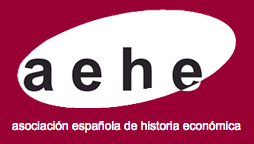La evolución de la industria harinera en España durante el siglo XX
DOI:
https://doi.org/10.1016/S1698-6989(06)70238-7Palabras clave:
Industria harinera, Harina, Molinería, Complejo triguero-harinero, Industria Alimentaria, Economía Española en el siglo XX, L66, N54, N64, Q13Resumen
Este artículo analiza la evolución de la industria harinera en España durante el siglo XX, una rama productiva que, en el conjunto de la industria alimentaria, ha seguido una tendencia declinante, especialmente durante las últimas décadas del siglo XX, dada la decadente evolución del consumo al ser un producto de baja elasticidad-renta. Se muestra cómo el desajustado crecimiento que ha vivido esta rama productiva desde los años posteriores a la I Guerra Mundial y durante la mayor parte del Novecientos se ha caracterizado por: 1) un crecimiento de la capacidad productiva muy superior al de la producción y el consumo; 2) la existencia de un crónico minifundismo fabril y empresarial compatible con un reciente y largo proceso de reconversión hacia su concentración; 3) la creciente regulación e intervención pública del subsector; y 4) la afirmación de una localización industrial harinera —un producto de bajo VAB y muy alto peso de la materia prima en los costes productivos— que ha tendido a converger con las zonas trigueras.Descargas
Descargas
Cómo citar
Número
Sección
Licencia
Aquellos autores/as que tengan publicaciones con esta revista, aceptan los términos siguientes
- Los autores/as conservarán sus derechos de autor y garantizarán a la revista el derecho de primera publicación de su obra, el cuál estará simultáneamente sujeto a la Licencia de reconocimiento de Creative Commons Reconocimiento-No comercial-Sin obra derivada 4.0 Internacional que permite a terceros compartir la obra siempre que se indique su autor y su primera publicación esta revista, y no permite hacer uso comercial de la misma ni tampoco obras derivadas.
- Los autores/as podrán adoptar otros acuerdos de licencia no exclusiva de distribución de la versión de la obra publicada (p. ej.: depositarla en un archivo telemático institucional o publicarla en un volumen monográfico) siempre que se indique la publicación inicial en esta revista.
Plagio y fraude científico
La publicación de un trabajo que atente contra los derechos de propiedad intelectual será responsabilidad de los autores/as, que serán los que asuman los conflictos que pudieran tener lugar por razones de derechos de autor. Los conflictos más importantes pueden darse por la comisión de plagios y fraudes científicos.
Se entiende por plagio:
- Presentar el trabajo ajeno como propio.
- Adoptar palabras o ideas de otros autores sin el debido reconocimiento.
- No emplear las comillas u otro formato distintivo en una cita literal.
- Dar información incorrecta sobre la verdadera fuente de una cita.
- El parafraseo de una fuente sin mencionar la fuente.
- El parafraseo abusivo, incluso si se menciona la fuente.
Las prácticas constitutivas de fraude científico son las siguientes:
- Fabricación, falsificación u omisión de datos y plagio.
- Publicación duplicada.
- Conflictos de autoría.





